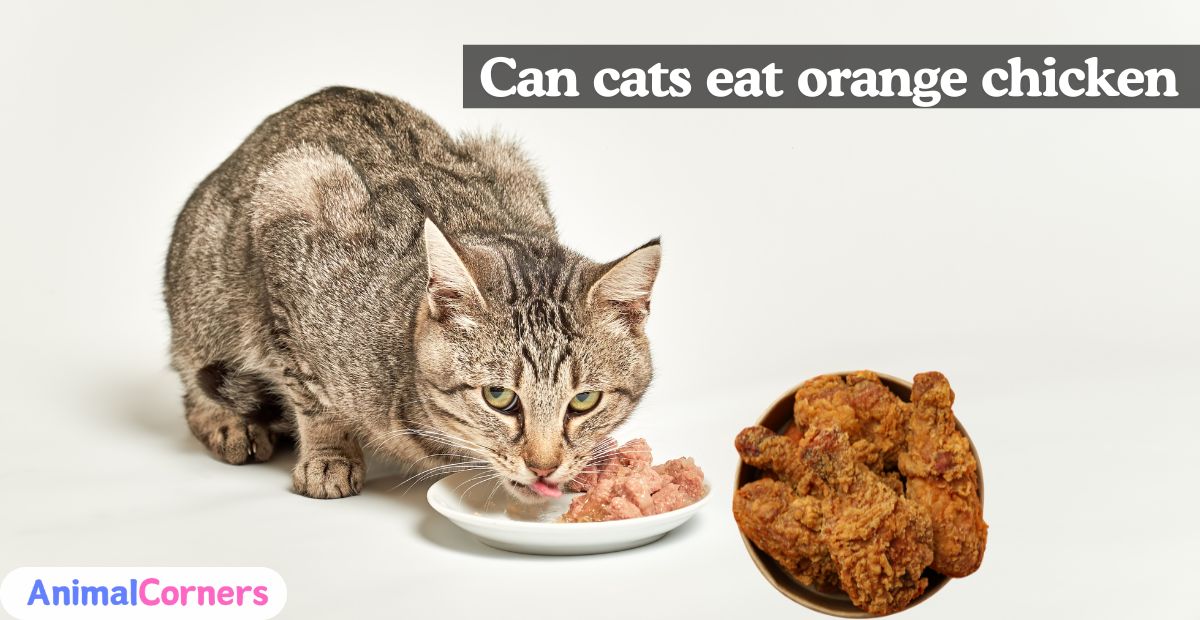Can Cats Eat Orange Chicken? Health Risks Explained

As a cat owner, you may have seen your cat staring at your plate of orange chicken with intense interest. One might wonder if sharing a bite is beneficial or detrimental. Indeed, cats enjoy tasting human food, and it’s reasonable to assume that a small amount won’t cause any harm.
In this post we will learn in detail about “Can Cats Eat Orange Chicken?
However, despite the apparent deliciousness of orange chicken, these ingredients may pose health risks to your cat. Take the toxic ingredients like garlic and citrus and combine them with the high sugar and fat content; orange chicken is something your cat definitely wants no part of. This article will examine the potential risks and provide better alternatives for maintaining a happy and healthy cat.
What Is Orange Chicken?
Orange chicken is a menu item in Chinese-American food; it is made from deep-fried, battered chicken chunks coated in wrinkled orange encrusted with sugar and served with an orange-flavored, slightly spicy sauce. The sauce typically includes ingredients like:
- Sugar or honey
- Soy sauce
- Orange zest or juice
- Garlic
- Ginger
- Red pepper flakes
Although delicious for humans, these ingredients can pose serious risks to your cat’s health.
Can Cats Eat Orange Chicken?
The Short Answer
Orange chicken is not at all healthy for cats to consume. Even though an occasional tiny piece will not kill your cat, with list of ingredients used to prepare orange chicken this is one of the worst foods that a cat can take.
Why Orange Chicken Is Unsafe for Cats
Even though you may consider feeding your cat orange chicken as a delicious treat, doing so entails the following risks to your cat. Here’s a detailed breakdown of why orange chicken is unsafe for cats:
Toxic Ingredients
- Garlic and Onion: These are common in the sauce and are lethal poisons to cats. Small amounts can affect the red blood cells in the bloodstream by breaking them apart and resulting in anemia characterized by lethargy, weakness, and pale gums.
- Citrus (Orange Juice or Zest): Some of the acids and oils that are present in citrus fruits or their peels are lethal to cats. Intake of citrus products results in vomiting, diarrhea, and weariness.
High Sugar Content
Orange chicken must have high quantities of sugar or honey in order to give the dish this taste. Cats are natural meat-eating animals and they lack the enzymes to break down or metabolise sugar. Consuming too much sugar can lead to:
- Obesity
- Diabetes
- Digestive Problems
Over time, a high-sugar diet can severely impact your cat’s overall health.
Spices and Seasonings
The sauce often includes spices such as:
- Soy Sauce: High in sodium, soy sauce can cause salt poisoning in cats. Symptoms include dehydration, vomiting, and even seizures.
- Red Pepper Flakes or Chili: Spices can irritate your cat’s digestive tract, leading to stomach pain, vomiting, and diarrhea.
Cats have sensitive stomachs, and these ingredients are far too harsh for them to handle.
Fried Batter
The crispy coating of orange chicken is deep-fried and full of unhealthy fats. The greasy batter can cause:
- Pancreatitis: Inflammation of the pancreas, which is painful and can be life-threatening.
- Obesity: Regular consumption of fatty foods can lead to unhealthy weight gain.
- Digestive Upset: Cats are not equipped to process fried foods, which can lead to vomiting or diarrhea.
High Fat Content
Orange chicken is not only fried but also coated in a sauce that may contain additional oil. High-fat foods are difficult for cats to digest and can lead to:
- Liver Disease: Excess fat can damage the liver over time.
- Pancreatitis: A dangerous inflammation of the pancreas caused by consuming high-fat foods.
- Weight Gain: Obesity can lead to further health issues like joint pain and heart disease.
Potential Health Risks of Feeding Orange Chicken to Cats
Gastrointestinal Issues
Cats who eat orange chicken may experience:
- Vomiting
- Diarrhea
- Stomach pain
Pancreatitis
The high-fat content and seasonings in orange chicken can inflame your cat’s pancreas, leading to pancreatitis, a painful and potentially life-threatening condition.
Anemia
Ingredients like garlic and onion can damage your cat’s red blood cells, causing anemia. Symptoms include:
- Lethargy
- Pale gums
- Weakness
Salt Poisoning
Excessive sodium intake from soy sauce can lead to salt poisoning, causing symptoms like:
- Increased thirst
- Seizures
- Vomiting
What Should You Do If Your Cat Eats Orange Chicken?
If your cat accidentally ingests a piece of orange chicken, monitor them closely for any signs of distress, including:
- Vomiting or diarrhea
- Lethargy
- Lack of appetite
When to Contact a Vet
If your cat shows any of the following symptoms, contact your vet immediately:
- Difficulty breathing
- Persistent vomiting
- Seizures
- Pale gums
Prompt veterinary care is crucial to prevent severe complications.
Safer Alternatives to Orange Chicken
If you want to treat your cat, here are some healthier alternatives:
- Plain Cooked Chicken: Veterinary advice to feed your parrot with boiled or grilled chicken without any seasoning is allowed and healthy.
- Commercial Cat Treats: Opt for high-quality products designed for cat’s diet asIRMATION|Choose specialized premium quality cat’s treats.
- Freeze-Dried Meat Treats: They contain a high percentage of protein and are not infiltrated with any ill-health producing chemicals.
Remember that treats should never contribute more than 10% of the total diet of your cat.
Conclusion
Although it is quite common to offer some of what you are eating to a curious cat, orange chicken is one food you should not even dare to touch. Lethal components such as garlic, onion, and citrus, when combined with sugar, spices, and fats, threaten your cat’s life. Avoid them at all costs, as just one small bite can cause hemorrhagic diathesis, dyspepsia, or pancreatitis.
It’s crucial to provide your cat with treats that meet their nutritional needs, ensuring their safety. Choose cooked chicken without seasonings or feed your cat vet-recommended commercial treats instead. The following correct choices will help you keep your feline friend hale and healthy, always by your side for many years.
FAQs About Can Cats Eat Orange Chicken
Is Orange Chicken Toxic to Cats?
Essentially, yes, orange chicken is toxic to cats owing to such components as garlic, onion, and even oranges or any other citrus fruit. These can lead to anemia, digestive problems and many other health complications. The best course of action is to not feed your cat any of it at all.
Can a Small Bite of Orange Chicken Harm My Cat?
A small bite is dangerous because the product may contain toxic substances, and its fat content is significantly higher. A single bite may not give one serious harm but it could cause digestion related complications or even lifetime diseases.
Why Is Garlic in Orange Chicken Dangerous for Cats?
Garlic has been linked to hemolytic anemia in cats or in simple terms it distroys the red blood cells of a cat. Illness signs include weakness throughout the respective areas, pale gum margins, and anorexia in affected dogs. Orange chicken must be avoided because even a little garlic is toxic.
What Should I Do if My Cat Eats Orange Chicken?
If your cat has become poorly, these could be vomiting, diarrhea, or general weakness. If they ever occur you should call your veterinarian for advice and instructions on what needs to be done next.
Can Cats Eat Plain Chicken Instead?
Yes, you can give your cats unseasoned chicken, raw, and with no seasoning added; it is safe for them to consume. This makes it a rich source of protein and a nutritious snack option. Do not add spices, sauces, oils, etc., in order for it to be safe for consumption by your cat.
Are Citrus Fruits Like Oranges Harmful to Cats?
Indeed, citrus fruits contain substances that are poisonous to cats. Consumption of oranges or their zest is known to trigger vomiting, diarrhea, and lethargy. You should avoid giving your cat any citrus fruits at all.
Why Is Fried Food Bad for Cats?
People with digestive disorders should not consume fried foods because they are oily, fatty, and cause pancreatic swelling and obesity. Fried foods are not suitable for cats due to their inability to digest them properly.




